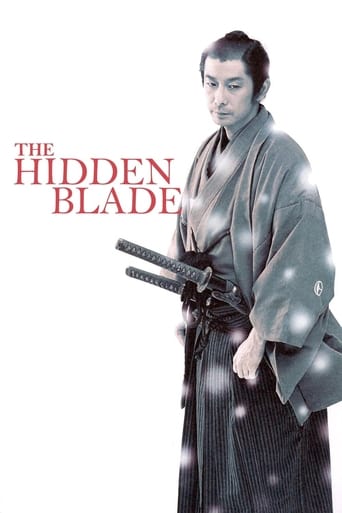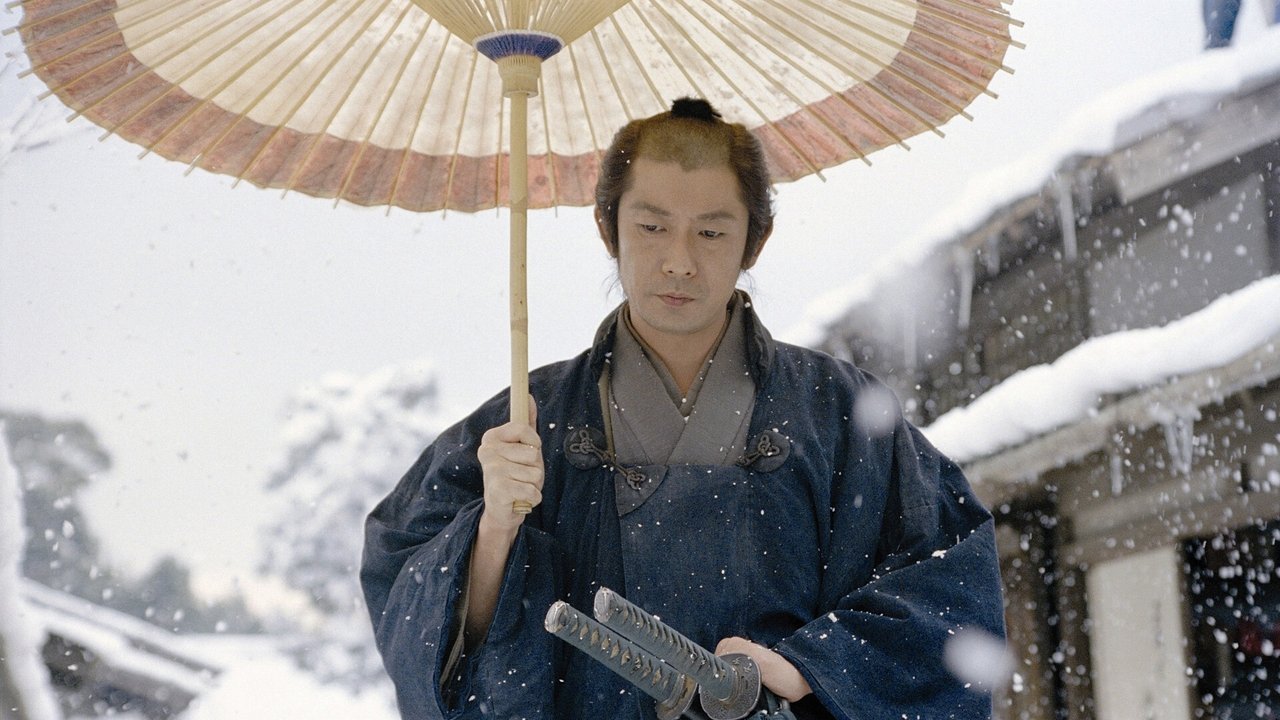pacmanian
Fabulous movie with a great storyline.The main protagonist's character is very well-developed in the movie as it moves on. I expected to use this movie to help me sleep, and was I wrong big time.I was engrossed fully throughout the movie, and the ending regarding the hidden blade was splendid, I did not expect it at all.It's not an all action movie, it's more drama, but it was like watching through a window looking in to the life of a samurai and those around him, as they lived in their own time.Beautiful work of art ...
ebiros2
This is the second of director Yoji Yamada's work on converting Shuhei Fujisawa's novels into a movie, and first from the Fujisawa's Hidden Sword series short novels. Other stories from Hidden Sword series that Yoji Yamada made into movies includes Hisshi Ken Torizashi, and Bushi no Ichibun.This movie is an amalgamation of two of Shuhei Fujisawa's novels - one is the title novel Kakushi Ken Oninotsume, and the second Yuki Akari (Snow Light) which is a love story. Fujisawa's novel has a style that mixes human drama and the unusual talent the main character has that leads to the bombastic climax. This movie is no exception.True to its origin, there are two stories going on simultaneously in this movie. One is story between Shuzo Katagiri (Masatoshi Nagase), and Kie (Takako Matsu) who is a maid that was working at Shuzo's house since she was a child, and Shuzo's friend Yoichiro (Yukiyoshi Ozawa) who planned a coup against the clan and is now being jailed awaiting execution. Kie was married to another family, but she was treated very poorly, and became ill. She would have died if Shuzo has not extricated her from that family and brought her back. But living with a woman he saved, causes rumors and he decides to let Kie return to her family. Yoichiro escapes from from imprisonment and because he's one of the best swordsman in the clan, Shuzo who is the only one that can match Yoichiro's skill is dispatched to take him down.This is one of the best samurai movies to come out of Japan in recent years. All of Yoji Yamada's movies based on Shuhei Fujisawa's novels are excellent quality, with some of the best sword fighting scenes. The entire series is recommended for viewing as they are some of the best Asian movies you can watch.
KineticSeoul
While "The Twilight Samurai" is touching and moving while being realistic, this movie has a bit of realism but has more to do with loyalty and virtue. Although this has more action than "The Twilight Samurai" the trailer can be misleading cause this movie is far from being a action packed movie. And like the previous movie it takes patience to enjoy although it's a movie that isn't for everyone. The pacing might be a bit slow but isn't too slow to the point it makes the audience lose their attention. While the previous movie had to do with family, this one has multiple themes combined into one but it works very well. And the portrayal is more realistic when it comes to samurais because it's not idealistic like it's portrayed in some movies. This movie has elements from the movie "The Last Samurai" in it, but goes in a more realistic direction since it isn't really idealistic. The romance elements is done pretty well and believable for most part. Despite the premise of this movie, it isn't action packed with a lot of sword fighting. So if your expecting that, you will be left disappointed but what it does accomplish is that it makes you believe that all the character in the movie is real and so is the plot. Thus it makes the whole experience engrossing and goes in a direction where it isn't really dry despite not having a lot of action for a movie that has samurais and the use of western weapons in it.7.3/10
noralee
"The Hidden Blade (Kakushi-ken: oni no tsume)" is filmed in a deceptively old-fashioned and leisurely style to make pointed observations of Japanese society, much as "Far From Heaven" did for the U.S. Director/co-writer Yôji Yamada again adapts Shuuhei Fujisawa stories as he did so beautifully in "Twilight Samurai (Tasogare Seibei)". Taking place just a few years before Hollywood's "The Last Samurai", this feels like a rebuke and response to that very Westernized interpretation of some of the same issues of how changes in military technology impacted feudalism and imperialism, as well as visually referencing many classic Japanese samurai films, but from a more individualized point of view then Kurosawa, Kobayashi or InagakiThe first half of the film establishes the complicated domestic life and frustrating work of the struggling samurai (a solid and sympathetic Masatoshi Nagase, channeling Toshirô Mifune). The broadly comic scenes of fumbled rifles and cannon training recall similarities with the "Sharpe" TV series of the just a bit earlier Napoleonic wars. Particularly lovely are household hearth scenes of warmth between generations and between master and servants.But this is not the idyllic village where Tom Cruise sojourned, as darker abuse is revealed and the samurai flaunts rigid social protocols to do right by those he cares for, especially the young maid "Kie" (Takako Matsu channeling the three little maids from "The Mikado" a bit too much). He is slow to reveal emotions or take action (the romance goes beyond Jane Austen in its cross-caste sidling and very slow resolution), suppressing vivid childhood memories we see very briefly in flashbacks in contrast to his voluble friend who rebels, including against traditional suicide.The emphasis throughout the film is on generational conflict, as elders who are to be venerated are constantly shown to be fools or much worse -- old uncles complain about younger people (whose names they can't keep straight) using the new Western weapons, but place a higher priority on eating; a mother-in-law viciously mistreats her daughter-in-law to increase profits; a corrupt senior retainer (the feudal titles do not seem well-translated in the subtitles) lies and manipulates while enjoying geishas and complaining about his prostate problems. But a teacher derided as a "crazy old man" who can still best the young swordsman passes on more useful stealth techniques than the martinet drill sergeant who has inherited the honorific "sensei" with his British guns.While as usual in such films, I simply cannot follow the Byzantine shogun politics even with a superfluous narration, as I've never studied Japanese political history, the second half ironically builds on the iconography of the genre with unusual sights and sounds. Macho conflicts are filmed voyeuristically, with sidling camera angles that indicate a passing from mano a mano duels to the anonymity of modern weapons, and thus justifying the use of the titular vengeance.The exquisite cinematography and sound design create a special environment. With a look of faded epic cinematography like the passing of an age, we see snow falling on parasols, cherry blossoms on the path and rain fall on unrequited love. We hear them too, as the breezes, wind, crickets, birds, rain and the household sounds of tools and crackling fire punctuate long silences and dominate more than the conventionally soaring score that is used judiciously. But a prison and eventual bloody fights in a heavily symbolic fog are not minimalized.The production design is much more elaborate in showing us traditional architecture than most such Japanese films. I'm sure some of the social and historical commentary just goes by a Western audience unfamiliar with particulars, but the themes of individuals caught up in social proscriptions who rebel and seek love, respect, peace and, most of all, control over their lives is universal and very involving.


 AD
AD



